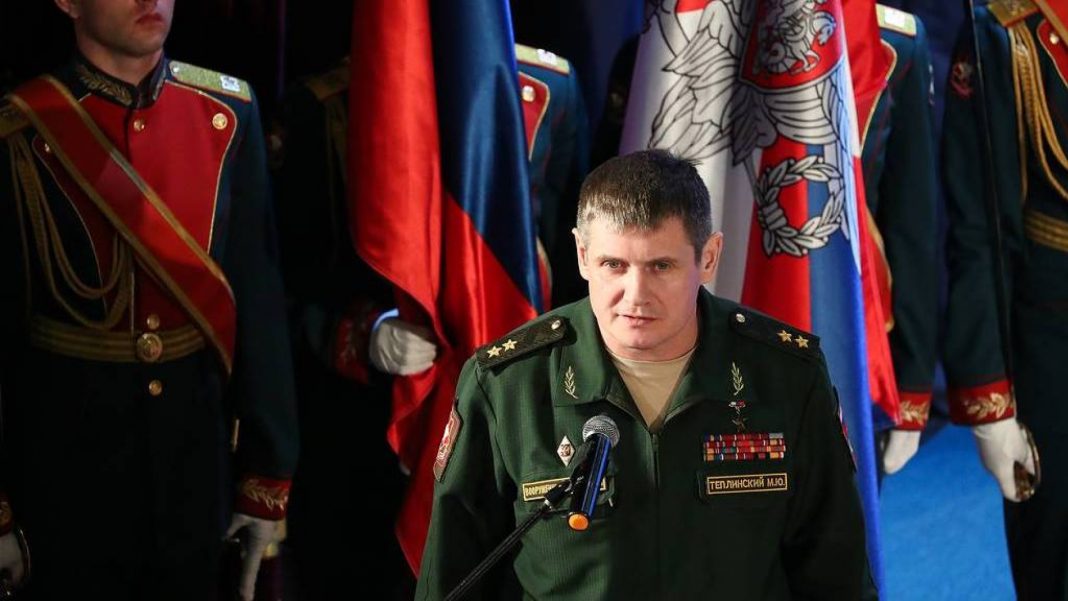Mikhail Yuryevich Teplinskiy was born on January 9, 1969, in the village of Mospino, Donetsk Oblast of the Ukrainian SSR (now part of the Donetsk urban agglomeration). His father, Yuri Mikhailovich Teplinskiy, was born June 28, 1940, and worked at the Mospino coal processing plant. According to some statements, the mother, Teplinskaya (Anufrienko) Nina Maksimovna, born July 26, 1945, worked in a local kindergarten. The family lived in Mospino at 45 Gagarina Street. As of 2023, only the mother of Mikhail Teplinskiy is known to have survived. On March 12, 1976, another son, Dmitry, was born. In 2006, in the Donetsk Oblast, the younger Teplinskiy became a defendant in a criminal case under Art. 314 part 2 of the Criminal Code of Ukraine (Illegal injection of narcotic drugs, psychotropic substances or their analogues into the body). To extort money, he and two accomplices forcibly injected amphetamine to a local businessman. Fleeing from criminal prosecution, he left for the Russian Federation, where, with the help of his brother, he obtained Russian citizenship, and in October 2008, he even received the Order of Courage from the hands of then President Medvedev in the Kremlin (supposedly for participation in the war against Georgia). However, in 2009, he was also on the Russian federal wanted list.
This Content Is Only For Subscribers
After leaving school in 1987, Mikhail Teplinskiy entered the Ryazan Higher Airborne Command School, named after Lenin Komsomol, from which he graduated in 1991.
He began his service in the 106th Guards Airborne Division stationed in Tula. He commanded an airborne reconnaissance platoon and a reconnaissance company of the 137th Guards Airborne Regiment (Ryazan). In 1992-1993 he liquidated the armed conflict in Transnistria.
At this time, Teplinskiy got married. The wife of Mikhail Teplinskiy, Natalya, was 19 years old at the time of the wedding (she was born on July 16, 1974, in Mykolaiv). Teplinskiy’s father-in-law, Igor Mikhailovich Krakosevich (02/23/1947 – 03/15/2021), was a lieutenant colonel of the Airborne Forces. Until 2017, Teplinskiy’s father-in-law lived in Ukraine, in Mykolaiv, but then he moved to Voronezh, where he died.
From December 1994 to March 1995, Teplinskiy participated in the battles of the First Chechen War. He distinguished himself in fighting during the crossing of the Sunzha River. Senior Lieutenant Teplinskiy had about 30 destroyed militants during hostilities on his personal combat account.
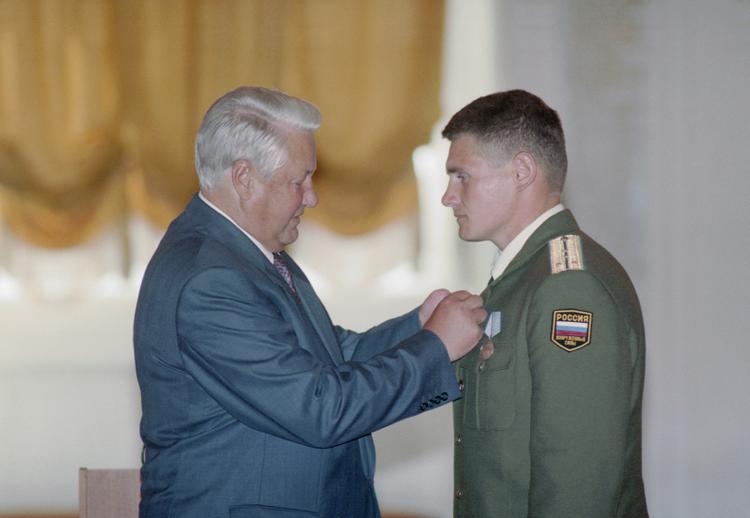
In 1995, Mikhail Teplinskiy was awarded the title of Hero of Russia for holding the railway station in Grozny as part of the so-called “Courage Battalion” under the command of Colonel Svyatoslav Golubyatnikov. According to Golubyatnikov, Teplinskiy performed the most difficult tasks in Chechnya while not losing a single person killed. The media wrote:
“The commander of the reconnaissance company 137 PDP, senior lieutenant Teplinskiy, tactically correctly chose the dominant high-rise building in the station area, took possession of it with a sudden throw, blew up the stairwells between the first and second floors and stayed there with the company for several days, did not lose a single fighter and had only five wonded”.
Another source says: “On the tragic day of January 1, 1995, at the head of a group of scouts, he made his way to the centre of Grozny, to the railway station area, where the military equipment of the dead units of the 131st Maykop motorised rifle brigade was still on fire. He identified a building that towered over the surrounding micro-district, station buildings, and customs. Mastery of this building allowed control of the entire area. Having quietly penetrated the building, the paratroopers silently destroyed a group of militants, including two grenade launchers and one sniper. A few hours later, the first large group of Dudayevites (12 people), walking around in ecstasy from the victory won, died under heavy fire from the paratroopers. All enemy attempts to recapture the building ended only with new losses of the attackers. For several days the company of Teplinskiy successfully repelled enemy attacks, sometimes even in conditions of complete encirclement. In total, during the defence of the building, the paratroopers destroyed 44 militants. The courageous defence of the paratroopers made it possible to keep the adjacent region of Grozny under the control of Russian troops. From here began the operation to liberate the city. When subordinates of Teplinskiy joined their forces, there was not a single dead, and only five fighters were injured. He distinguished himself in further battles while crossing the Sunzha River. When going around posts on a busy bridgehead with one of the sergeants of his company, he suddenly ran into 10 militants. In a fleeting fight, Teplinskiy and his sergeant killed 5 militants. Then, upon the reinforcements’ arrival, the reconnaissance company commander combed the area. At the same time, another enemy group was identified, from which 12 militants were destroyed on the spot. During the period of hostilities on the personal combat account of M. Yu. Teplinskiy had about 30 killed militants. While still in the Chechen Republic, he received a promotion in rank and position: he became the parachute regiment’s captain and head of intelligence.
In 1999 he graduated from the Combined Arms Academy of the Armed Forces of the Russian Federation.
He commanded a paratrooper battalion during the Second Chechen War (since 1999). Then he was transferred to the 76th Guards Airborne Division (Pskov, registered at the address: Pskov, 93-A Yubileynaya Street, apt. 110); was chief of staff and commander of the 234th Guards Airborne Assault Black Sea Order of Kutuzov Regiment named after Alexander Nevsky, deputy commander of the 76th division, chief of staff of the division.
In 2007, after graduating from the Military Academy of the General Staff of the Armed Forces of the Russian Federation, he was appointed head of the 212th Guards District Training Center named after the Hero of the Soviet Union, Lieutenant General I.N. Russiyanova.
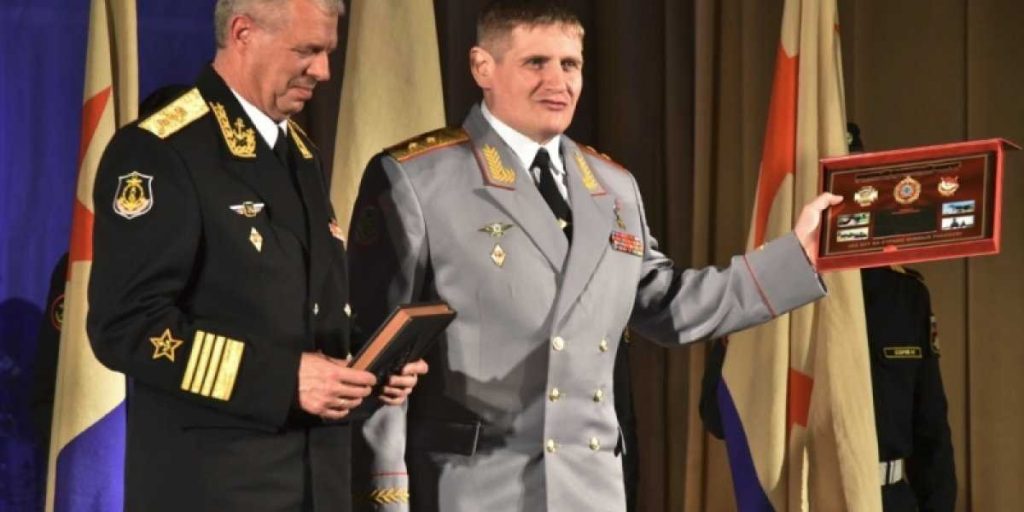
Since June 2009, served as the Chief of Staff – First Deputy Commander of the 20th Guards Combined Arms Army of the Western Military District.
Since February 19, 2013, served as the Commander of the 36th Combined Arms Army of the Eastern Military District.
In 2014, Major General Teplinskiy was seconded to Syria but was recalled a few months later. Upon his return, he commanded a group of Russian troops that defeated Ukrainian troops in the battle near Ilovaisk. As a reward for this, on December 13, 2014, he was awarded the rank of lieutenant general.
In May 2015, Teplinskiy was appointed chief of staff of the territorial troops in the Southern Military District (headquarters in Rostov-on-Don). Teplinskiy was subordinate to the 1st and 2nd army corps on the self-proclaimed “DNR” and “LNR “territory. In fact, it was Teplinskiy who, during 2015-2019, conducted military operations against the Armed Forces of Ukraine, de facto leading the troops of separatists from the self-proclaimed “DPR” and “LPR”.
On April 15, 2019, he was appointed Chief of Staff – First Deputy Commander of the Central Military District (headquarters in Yekaterinburg).
It is believed that Teplinskiy has friendly relations with the governor of the Tula region, Alexei Dyumin, and the commander of the Special Operations Forces, General Valery Flustikov. Also, not the last role is played by the fact that Teplinskiy is fond of hockey and even, thanks to Dyumin, played several times in the “Night League” together with President Putin. Most often, Teplinskiy goes on the ice as an attacker of the Rostov team “Octopus”.
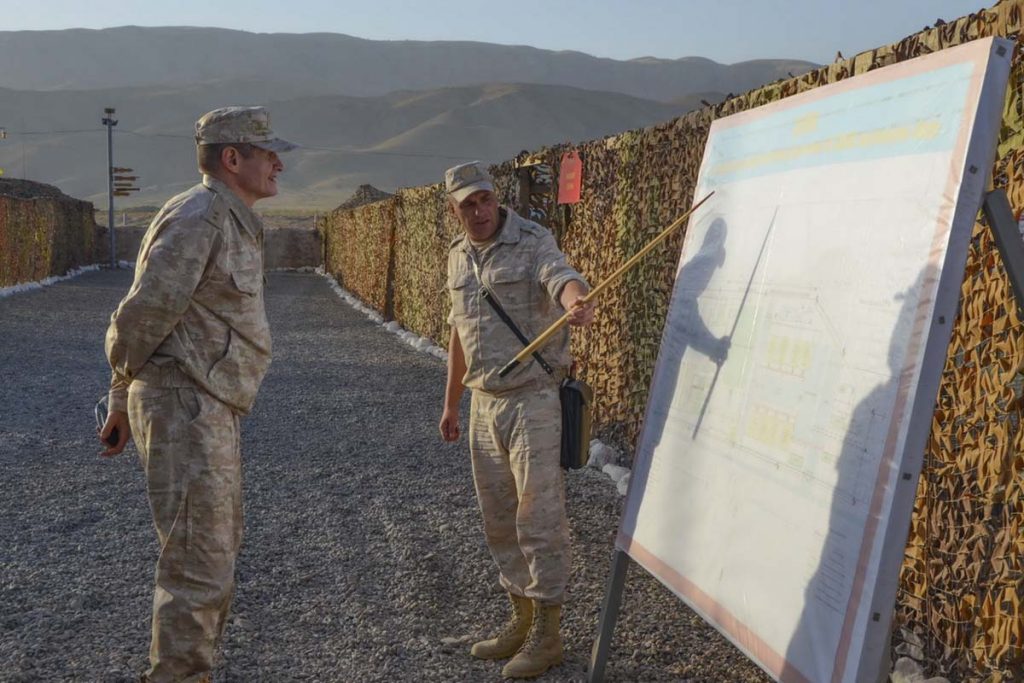
From the first days of the full-scale invasion of the Russian Federation into Ukraine, Teplinskiy has been actively involved in offensive operations. Teplinskiy designed the operation to capture the Gostomel airport near Kyiv. Although the operation failed because the main forces, due to the resistance of the Armed Forces of Ukraine, could not approach Gostomel in time, the Russian media enthusiastically wrote:
“The operation is really unique, just in the style of the Airborne Forces. The operation was carried out by forces of 200 people, who were secretly transferred by helicopters from the territory of Belarus. The distance is only 60-70 kilometres, and the flight time is 20 minutes. The landing force landed at the airfield with limited forces, occupied key points for the facility’s defence, and accepted the battle in anticipation of reinforcements. Everything is like a textbook, so they teach in the Airborne Forces. Add to this the highest professionalism and courage of the paratroopers, who were able to complete the task and resist the enemy’s superior forces. The result is excellent: capturing a strategically important airfield and bridges across the Dnipro in Kyiv Oblast, which the nationalists planned to blow up. Excellent!”
The Official Journal of the European Union wrote in March 2023:
“Teplinskiy is the commander of the Airborne Troops. The airborne troops took part in the aggressive war against Ukraine. They were located directly on the site of the execution of the inhabitants of the city of Bucha. As commander, he is responsible for the actions of his unit.”
On June 16, 2022, Putin appointed Teplinskiy as commander of the Russian Airborne Forces. This appointment occurred after the analysis of the spring campaign of 2022 and the failure of the attack on Kyiv. The commission, which checked the circumstances of the defeat of Russian troops near Kyiv, decided that the former commander-in-chief of the Airborne Forces, Colonel General Andrei Serdyukov, was the culprit. In addition, the failures of the paratroopers during the capture of Chornobayivka were blamed on Serdyukov. The appointment of Teplinskiy, who enjoys considerable prestige in army circles, was received positively.
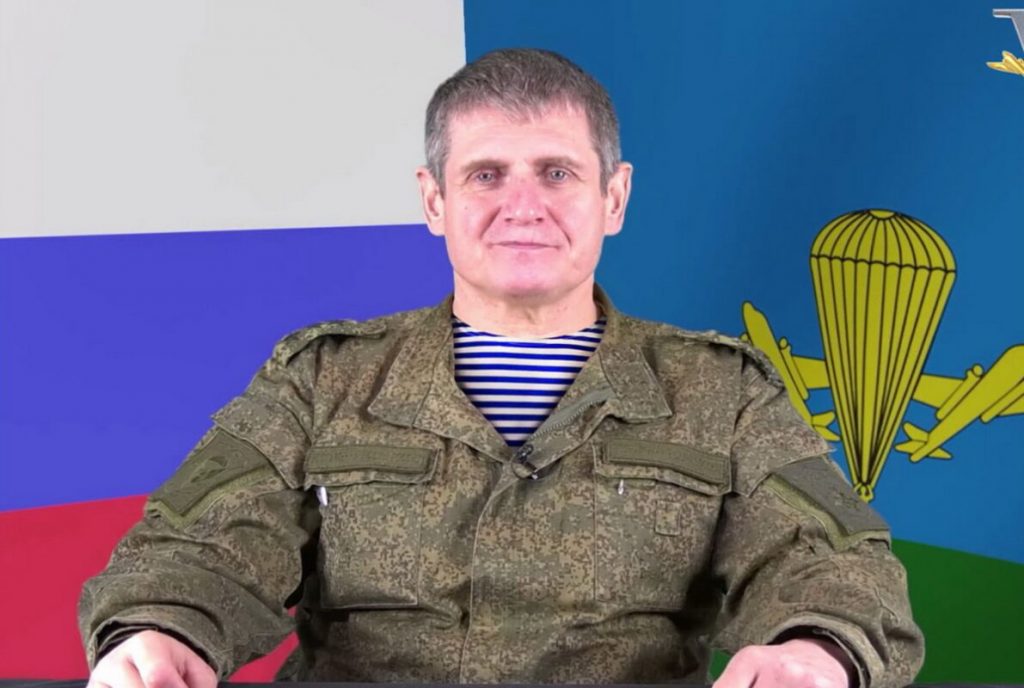
Interestingly, even some Ukrainian public noted Teplinskiy’s military talent:
“The assault on Liman was carefully planned and thoroughly prepared. That is, on the 93rd day of the war in the Russian Armed Forces, someone finally guessed that the success of the group preparing for the assault largely depended on the manageability of the units. According to the action plan, the tactical group consisted of two echelons, assault and buffer. Assault group-company/platoon on infantry fighting vehicles, reinforced with tanks, sappers, and air controllers included; buffer group – company/platoon on armoured personnel carriers, armoured combat vehicles. Assault groups storm objects, buffer groups take them under control and clean them up. Almost all this time, harassing fire was fired at the positions of the city’s defenders to exhaust them. A time schedule for the assault on the city was drawn up, with the group commanders carefully studying the area, the names of the streets, the outlines of the objects of the assault, and the routes to reach them. Russian intelligence of all kinds worked intensively for 7 days; radio-electronic and UAVs were especially tense. Our people say that the radio interception of the Russians worked very powerfully.”
Some war correspondents began to write about Teplinskiy as a “new Suvorov”, clearly wanting to flatter the promising general.
By autumn, Teplinskiy concentrated his efforts on the southern direction. As Telegram channel Rybar notes, “In the southern direction, the former chief of staff of the Central Military District, Colonel-General Mikhail Teplinskiy, who this year received almost collapsed airborne troops from Andrey Serdyukov, is in charge. Dozens of familiar officers speak of the strategic and tactical genius of Teplinskiy. Everyone treats him with boundless respect because the commander of the direction hears his subordinates.”
In November 2022, the commander of Russian troops in Ukraine, General Surovikin, decided to leave Kherson and evacuate the army to the left bank of the Dnieper. Teplinskiy came into conflict with Surovikin and the General Staff’s leadership. In fact, he was removed from command of the Airborne Forces and recalled from Ukraine. War correspondents wrote that Teplinskiy and the paratroopers loyal to him were ready to defend Kherson and expected to hold out until spring; however, according to Russian opinion, the high command was to blame for everything. It is possible that such rumours were pitched by his own to increase his authority in the army.
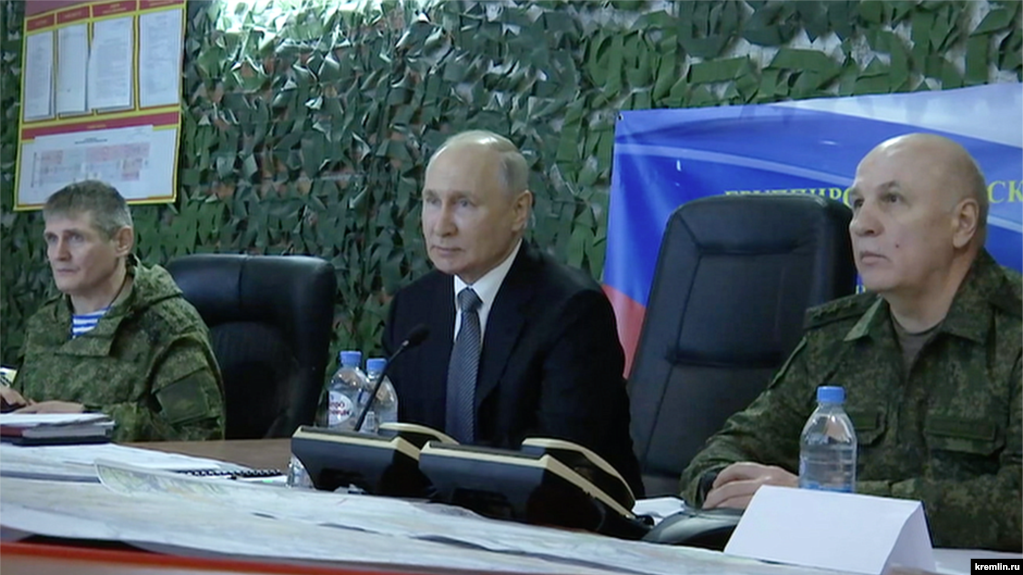
At the end of February 2023, Teplinskiy was returned to Ukraine and appointed first deputy commander – that is, Gerasimov, who by that time personally led the so-called “special military operation” and with whom Teplinskiy had a conflicted relationship.
In his address to the paratroopers on the occasion of February 23, Teplinskiy said:
“It so happened that I have been out of the war for over a month after almost a year of fighting. I can’t describe how it is given to me daily in the rear when comrades-in-arms are fighting and dying at the front. When showing transcendent courage, the troops entrusted to me fight with the enemy. When the front is 30 kilometres from my father’s house, where my father is buried and where my mother lives. Therefore, my greatest desire today is to return to the front as soon as possible.”
At the same time, the head of the Wagner PMC, Yevgeny Prigozhin, highly appreciated the work of Mikhail Teplinskiy in the so-called “SMO” area. When asked to describe the general’s alleged resignation, Prigozhin said he could leave the post because of his honesty and “refusal to engage in sycophancy.” In addition, the head of the PMC expressed the hope that Mikhail Teplinskiy and his colleague Sergey Surovikin will soon take senior positions in the Ministry of Defense.
It should be said that by this time, they began to talk about Teplinskiy as Putin’s new “favourite”. Moreover, at a meeting with the President of the Russian Federation, Teplinskiy himself raised the issue of the need for a radical reform of the Airborne Forces.
“It was Teplinskiy who was the first to raise at a high level the question that the current conditions of the war dictate the need to reform the Airborne Forces, to equip individual units with heavier weapons, with more power and armour. Now almost all military equipment of the landing troops is focused on the possibility of parachute landing, where weight played a role to the detriment of armour and calibre. The airborne combat vehicle weighs about seven tons, and the infantry fighting vehicle is twice as much, over thirteen tons, which makes the BMP more protected in battle. The maximum calibre of artillery installations of the Airborne Forces is limited to 122 mm. In comparison, army artillery has 152 mm calibre guns, which are more long-range and effective. Teplinskiy pointed out that the landing troops were becoming more airborne. The Airborne Forces are strengthened precisely with heavy weapons, tanks are no longer exotic, and large-calibre artillery. It is the potential of the airborne divisions that are being strengthened, which are comparable in number to the ground divisions, but lose in terms of technology,” wrote the Russian media.
Some experts (including foreign ones) assessing the return of Teplinskiy to the army said that his task was to maintain contact with Yevgeny Prigozhin and the Wagner PMC. Others argued that Teplinskiy would promote the Airborne Forces as the strike force of the Russians, as opposed to private military companies.
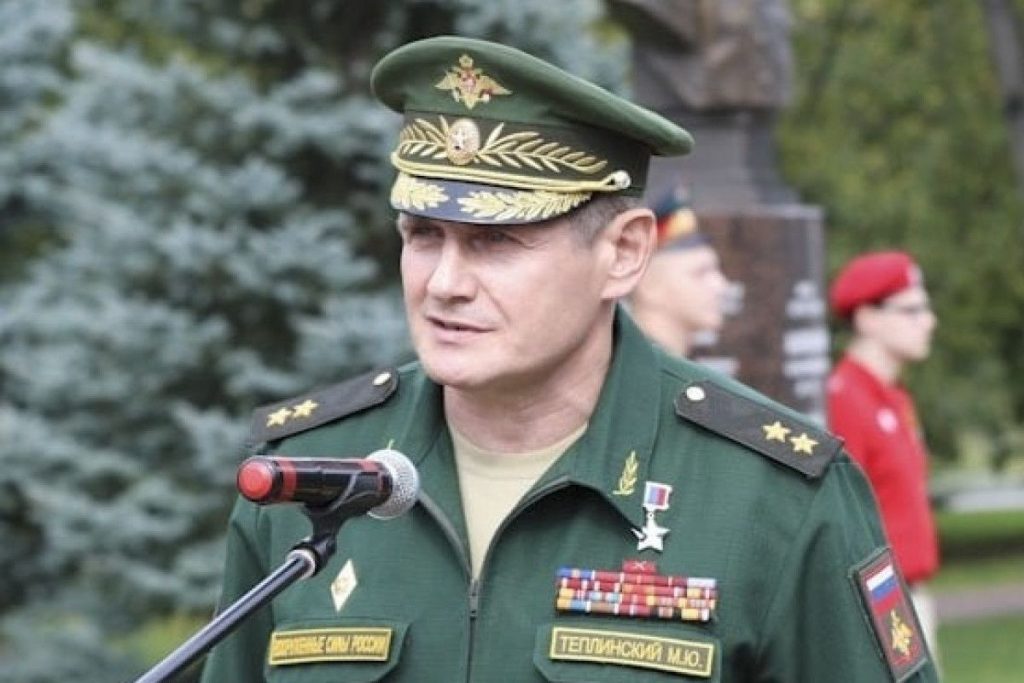
Teplinskiy flew to Rostov-on-Don in the same helicopter with General Alexander Lapin, chief of the main headquarters of the Ground Forces of the Russian Federation, against whom Yevgeny Prigozhin and Ramzan Kadyrov actively opposed and who enjoyed the patronage of Sergei Shoigu and Valery Gerasimov.
On April 29, 2023, Teplinskiy spoke to the graduates of his native Ryazan Higher Airborne Military School with a fiery but demagogic speech:
“After 80 years, we, like our grandfathers and great-grandfathers once, are once again liberating long-suffering Ukraine from fascism. And, as once, we are again confronted by the forces of a united Europe, waging a real hybrid war against us, the instrument of which the West has made the puppet Ukrainian government. Having taken over the Kyiv regime, increasing the supply of equipment and weapons, training the Ukrainian army and exercising leadership over it, the United States and its allies bear no less responsibility than Kyiv for the death of the civilian population of Donbas, the territories we are liberating. And our duty is to protect people from this genocide. The ultimate goal of the US and its allies is to weaken, or better yet, crush, Russia by depriving it of an independent foreign policy. The actions of the West left us with no other opportunity to respond to this challenge except for a special military operation against the Kyiv regime and its army. There was no alternative to the [so-called] “special military operation.”
In particular, Teplinskiy openly stated:
“There will be no peace with the Ukrainian regime and its patrons. Not for this, the United States and its allies, for 30 years, sparing no effort and means, turned Ukraine into anti-Russia to stop halfway. Having destroyed a significant part of the Bandera army, we have already dispelled the myth of Western superweapons. Neither Javelins nor HIMARS nor long-range howitzers provided the enemy with the expected advantage on the battlefield. And there are feuds between Kyiv and its patrons. Western masters are dissatisfied with the lack of military successes and the Kyiv regime with insufficient weapons supplies.”
Absolutely correctly, Teplinskiy stated the obvious thing:
“There were no such hostilities that we are conducting today either in Afghanistan, or in the Caucasus, or Syria. And although the airborne troops have hardly come out of wars and hot spots over the past half-century, there have been no hostilities of this magnitude and intensity since the Great Patriotic War.”
At the very beginning of July 2023, after the “coup” of Yevgeny Prigozhin, the media reported that the Chief of the General Staff of the Russian Federation, General Gerasimov, had left his post as commander of the so-called “special military operation” in Ukraine. Lieutenant General Teplinskiy was appointed to his place.
The general was included on several sanctions lists due to the invasion of Ukraine. On December 13, 2022, he fell under British sanctions because he participated in the Russian invasion of Ukraine. February 25, 2023, was included in the sanctions list of all EU countries. Teplinskiy is also under the sanctions of Ukraine and New Zealand.
In addition to his passion for hockey, Teplinskiy is fond of hunting and playing guitar.
His idol is Marshal Konstantin Rokossovsky (Teplinskiy uses a photo of Rokossovsky on social networks as his avatar).
Mikhail and Natalia Teplinskiy have three children: a daughter Anastasia and two sons.

